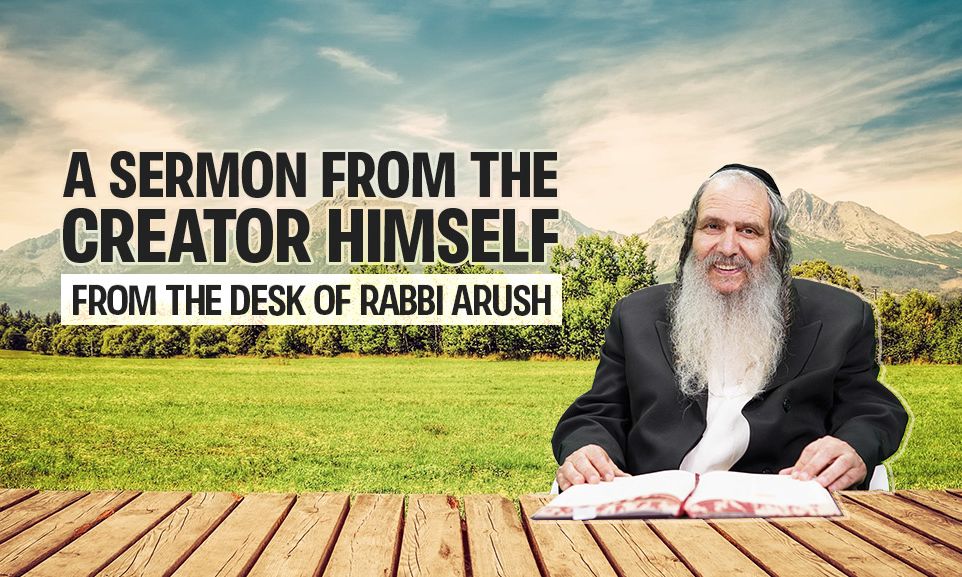
A Sermon From the Creator Himself
We are approaching the Day of Judgment when we will promise (again) to improve. Let's listen to Hashem's advice on how to succeed in really changing!

The Perfect Sermon
Imagine your small neighborhood beit knesset (synagogue) inviting the chief rabbi, the Rishon leTzion, to give an inspiring drasha (sermon) before the High Holy Days. Imagine that this rabbi, who is invited to so many places, agrees to come. This does not happen every day. What honor they will give him! The entire congregation will show up, as well as people from nearby congregations; men, women, and children will come to listen to him eagerly.
Think of the great figures from previous generations. What would a talk by HaRav Ovadiah sound like to you? By the Chafetz Chaim? Or the Beit Yosef? And if we go back to the Rishonim, it would be way beyond our concepts. If only we could hear one word from the Rambam, or from holy Rashi, from Abayei and Rava, from Rabbi Yehuda Hanasi, from Rabbi Akiva! And to think of the prophets, not to mention Moshe Rabbeinu or our Avot (Patriarchs) – that’s already way beyond our conception and comprehension.
So, I suggest you listen to an inspirational sermon for the High Holy Days of a completely different caliber. It’s a short sermon, but it is a message from the Creator of the World Himself.
Based on the infinite wisdom of Hashem, the Sages arranged for us to read the parasha of Nitzavim right before Rosh Hashanah every year. The Torah reading is a sermon from the Creator. And if parashat Nitzavim is always read before Rosh Hashanah, one may understand that there is something in this parasha that provides the best preparation for the days of judgment coming upon us, may they be good.
This parasha is one of the shortest in the Torah, but it contains both the mitzvah of teshuva and the promise of the complete geulah (salvation).
It is the perfect inspirational sermon of the Creator of the World as we approach the days of teshuva and rachamim (mercy), a message sent from Hashem Himself.
It is Not Merely “Near” – It Is “Very Near”!
Let’s focus on some special pesukim in the parasha: “For this commandment that I am commanding you today is not hidden from you and it is not distant. It is not in heaven… Nor is it across the sea…Rather, the matter is very near you – in your mouth and in your heart to perform it.”
The mitzvah of teshuva, the Torah tell us, is seemingly a very easy mitzvah – it’s not in heaven, it’s close to you. And not just close – it is “very near you.”
The most important thing to know about teshuva is that it is within reach! Very near you.
The greatest inhibition when it comes to doing teshuva is the thought that teshuva is something difficult, complicated, almost impossible; something way up in heaven, like reaching the top of Mount Everest. That is how most of us understand it and that is what distances the world from teshuva and tikkun (repairing). And the Torah finds it important to emphasize to us – through forms of speech and metaphors – that that is a serious error: “Not in heaven, nor across the sea.”
But you would think that teshuva is indeed something difficult. Teshuva means to change, and the hardest thing to do is to change. Ask anyone who has tried to stop smoking. It’s such a small and silly thing, and it is so hard to change. To stop getting angry, to stop eating unhealthy foods. Every “small” change like that requires battles and processes that take years, with many ups and downs. People sweat blood for such things.
All the more so, if we’re talking about complete teshuva, which is a complete and overarching change of one’s entire lifestyle and personality – is that easy?! Is that something that comes easily? How can you call it “very near”?
Only What You Can Do
You must understand something very deep and fundamental. There is a big difference between something easy and something close. There is a proverb that says even a journey of one thousand kilometers begins with one step. And anyone can take that one step. If you think that teshuva means doing very difficult or impossible things – you are badly mistaken. Teshuva is a process of a great many small steps. And the small step you can always take, wherever you are and whatever state you’re in, according to your present place and stature.
And that is what the Torah tells us: “In your mouth and in your heart to do”. Even if you do not have a heart – you can talk, right? You have a mouth? You can say a few words? So start talking. Start requesting. Start wanting, and express your wishes by mouth, even if you don’t feel anything in your heart. The Torah promises you: “in your mouth and in your heart.” If you start talking – you’ll get a heart, and when a person has a heart there is nothing impossible for him. He will be able to do everything!
And that is what we wrote last week. Everything begins with the ratzon, the will. But the ratzon starts from knowledge. If you know things in your mind – even if you don’t live them or observe them – you already have what to want and what to aspire to. If you just start wanting, you will see siyata diShmaya (heavenly help), above nature. Because when a person wants, he is walked there by Heaven; he receives from Heaven a heart to know. He is given da’at. And if he has da’at, he has everything, and he will also succeed in his efforts to change in practice.
All I Want Is Words
We are all wise and understanding, and we all know the Torah. The question is what do we do with this knowledge. The fact of knowing doesn’t help us change. A lot of people know a lot of things, and still behave in opposition to what they know. The only way to change is to turn the knowledge into ratzon and prayer. That is what is very near to you. And that is what makes teshuva into something that is indeed not easy, but very near, possible and realistic!
If you think that teshuva means to translate knowledge into action – you are correct that is very difficult and almost impossible. It is in heaven and across the sea. Very discouraging. And that is how years go by without a person changing.
Therefore, before Aseret Yemei Teshuva (the Ten Days of Repentance), Hashem gives us a wonderful awakening talk that is the key to teshuva, the key that has the power to give every person the tools to translate knowledge into action. How? To understand that teshuva means to channel knowledge into wants, yearnings and prayers. That a person does have the power to do. And when you take one issue and pray about it every day, even in the same words, and repeat them again and again, you will certainly manage to change. You will be given a heart and da’at from Heaven and you will succeed in realizing all your desires.
And that is the meaning of the pasuk, “Take words with you and return to Hashem.” Chazal tell us that Hashem is telling us: “All I’m asking from you is words.”
Your Torah Is My Pleasure
Therefore, when Rabbi Nachman speaks about teshuva, he speaks about speech. To talk to Hashem. Every day. Before doing anything, ask, in your own words, to do Hashem’s will properly. And the greatest thing is to pray about what you are learning, and mainly to choose one topic and pray about it every day repeatedly until you attain it. That is called “The labor of ratzon.”
The entire world was created so that man would change and become elevated. And when a person becomes elevated, all of Creation is elevated, and that is why Rabbi Nachman says that when a person makes prayers out of the teachings (torot), it causes Hashem unprecedented pleasure. Because the teachings are knowledge that is only in one’s mind. It is almost impossible for it to change a person essentially and internally without laboring over the ratzon. Only when a person makes prayers out of the teachings in a regular and constant way – only then does he get the da’at and the tools to really change.
Dear Bnei Yisrael, all of you are standing here today before the great and awesome Day of Judgment. We are all about to promise to Hashem that we want to improve our deeds. But we all know as well that we are not certain we will succeed. That is why we must listen to the Creator’s sermon who gives us the key for success, the only way to really change, so that we will be able to take upon ourselves from now onward to start getting into the habit of speaking to Hashem and asking Him to enable us to make His will our will.
We cannot take upon ourselves to change, because it is not within our power to do so. But to speak to Hashem – that is close to us, in our mouths and hearts to do. Anyone can take upon himself to do that. And therefore, that is the greatest and truest resolution to make in order to win our case in the Heavenly Court, and not only merit a good and sweet year, but to really change and make His will ours.
With wishes for a ktiva v’chatima tova, and a good and sweet year for the entire Jewish People.



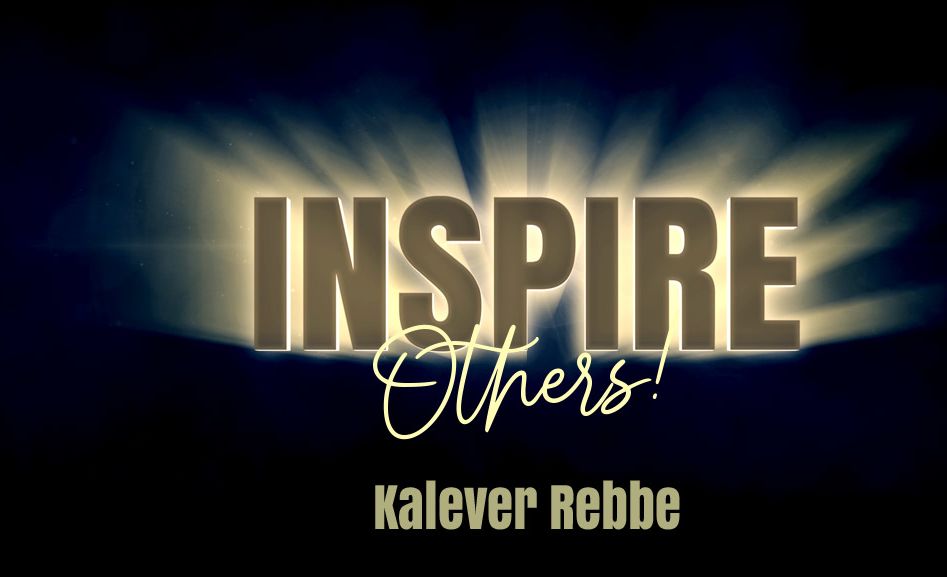
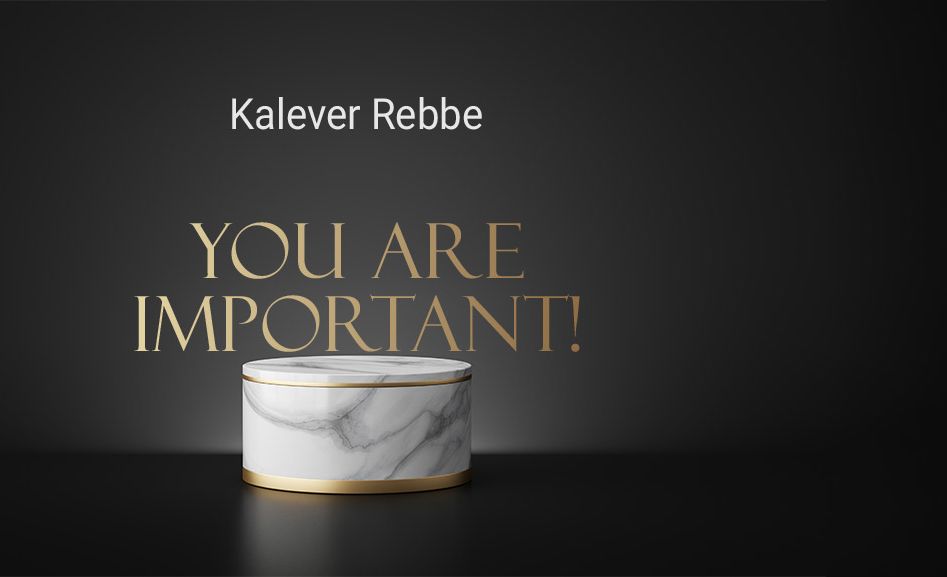
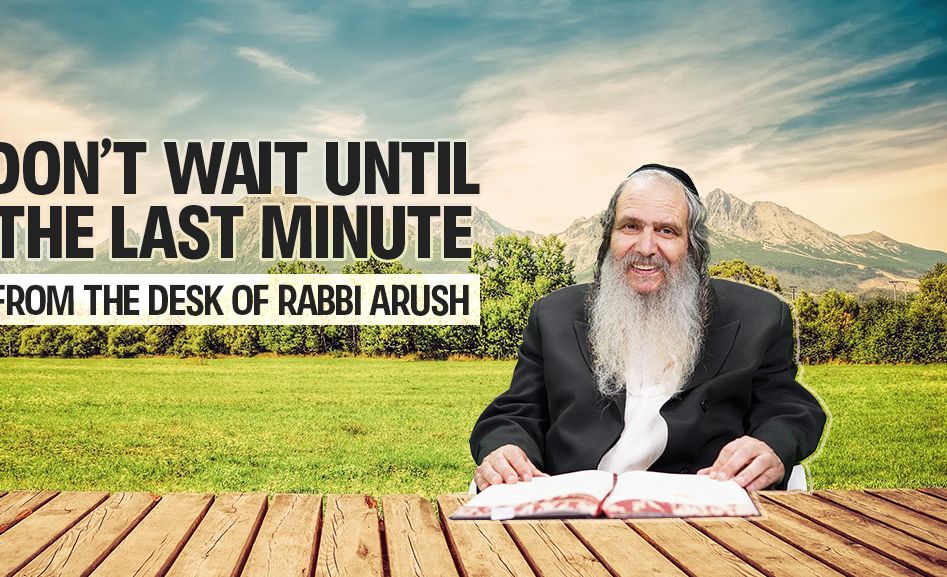


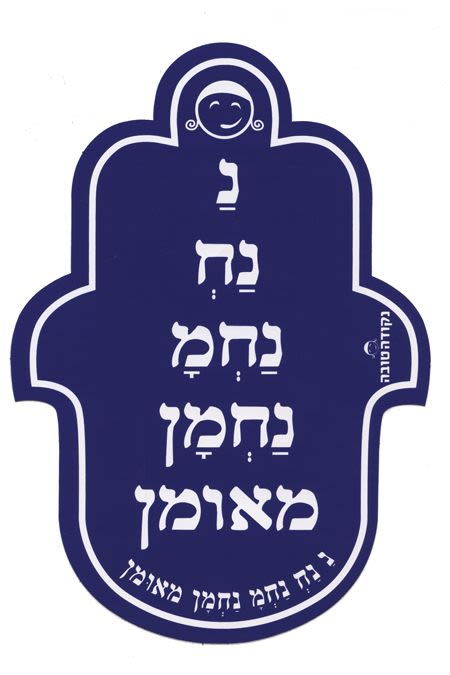

10/06/2022
Hi Aviva,
Thanks for your feedback! I hope that your Yom Kippur was blessed in all ways.
Yes, desire and speaking to Hashem will turn things around, but “how” and “when” are Hashem’s call. This is explained more fully in a different article Stop Being So Realistic (and the followup article).
10/06/2022
Hi Gilma Josefa Gamez Lopez,
I checked with our Social Media group – the article was posted on our Instagram site (https://www.instagram.com/breslev_english/) on 4-Oct.
We post Rabbi Arush’s main article in his weekly newsletter (translated from Hebrew). With the Sukkot holiday approaching, the newsletter might take a short “vacation”.
Thanks for your feedback!
10/05/2022
Gracias por un esenanza de poder elevar mejor nuestras plegarias mejor para toda la humanidad y paz del pueblo Judio